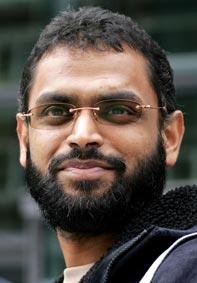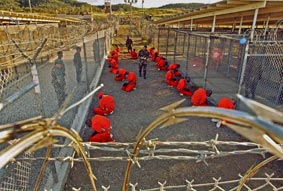After Guantanamo

Moazzam Begg was imprisoned for three years in Bagram and Guantanamo Bay, spending most of his time in solitary confinement. He was never charged with any crime. Fionola Meredith attended his Belfast lecture last month
Moazzam Begg doesn't look or sound like a dangerous man. The US government described the former Guantanamo Bay detainee as “an enemy combatant” and, when he was released without charge in early 2005, the Pentagon, the CIA and the FBI queued up to object, insisting Begg could still be a dangerous terrorist. According to the New York Times, the Pentagon believes Begg to be “a sympathiser, recruiter and financier for terrorists”. But, in person, Begg is far from the cartoonish, wild-eyed jihad-monster that haunts the jittery public imagination.
Sitting in a draughty Portakabin in Belfast's Custom House Square, where Begg is preparing to give the annual Amnesty International lecture, the first thing that strikes you is his size. He's surprisingly small: a wiry, neatly bearded and bespectacled figure, no more than 5ft 3in. Later, when he greets the audience, he jokes, “I used to be lot taller before Guantanamo.” The audience giggles uncomfortably. They didn't expect to be laughing at an event highlighting human-rights abuses.
Born to secular Muslim parents, Moazzam Begg was educated at the Jewish King David School in Birmingham. It was trips to Afghanistan in the 1990s, observing the then mujahideen preparing to fight in Kashmir, and to Bosnia, where he was moved by the plight of the poorly-equipped Bosnian Muslims, that radicalised Begg, inflaming his sense of injustice. Back in Britain, he drifted from job to job before starting an Islamic bookshop with a friend: a venture that caught the eye of MI5, which began paying visits from time to time.
Before he was seized by the US, Begg, his wife Zaynab and their three children had moved to Afghanistan, apparently in order for Begg to fulfil his ambition of becoming a teacher. But after 9/11 and the American invasion which followed hard on its heels, the family fled the country, ending up in neighbouring Pakistan. Begg was abducted in Islamabad by the CIA in January 2002 and taken to Bagram airbase in Afghanistan, where his long period of imprisonment began.
The second thing you notice about Begg is his unusual self-possession, an almost palpable sense of inner mental strength and focus. It's not that he's withdrawn or harsh in his manner – in fact, he comes across as quietly-spoken, gentle and articulate – but you feel that this is a man who has learned the values of self-control and sanity the hard way.
How do you stop yourself going mad when you're being held in solitary confinement without trial, when you're subject to horrific abuse? “Well, I didn't always: there were times when I thought I was losing my sanity. If you can imagine being in a tiny eight-by-six cell with no natural light, in which you can't walk more than three paces in either direction; you have no communication with your family, no legal recourse, you've already been through a period where you've been beaten and tortured, seen people being beaten to death in fact. Of course that takes its toll on whatever sanity you may have left.”

He describes what sustained him during that time. “Personal faith, and the ability to communicate with some of the guards that were empathetic if not sympathetic. I also tried to look at the situation in a philosophical way – asking myself, how can I benefit despite the adverse situation? What is it that I can take away from here? So there was the aspect of thinking, of time alone, of formulating my thoughts in ways that have made me more articulate than I've ever been in my life. All of those things sharpened my abilities. It's the sort of situation that either makes you or breaks you. It broke me in the beginning and then it made me.”
Begg is eloquent about the process of dehumanisation that creates the conditions for torture. “The first statement to detainees when you're taken into custody is: ‘You have no rights.' You are referred to as ‘enemy aliens'. In order to torture, you need to do this. A guard told me, ‘For us to be able to do our jobs properly, we must not look at you as human beings.” The fact that Begg delivers the bleak details of his incarceration at Bagram, and later at Guantanamo, in such a simple, matter-of-fact way makes it all the more disturbing. It's a grim narrative he must have told so many times. He calmly relates the now familiar allegations of abuse: how overhead lights were left blazing 24 hours a day; how detainees were stripped naked, spat at, kicked, punched at – or, in Begg's case, hooded, ‘hog-tied' so their hands were shackled to their legs, and beaten. According to Begg, inmates were often blasted with loud music – Eminem and the Bee Gees, or country and western music. In response to the latter, Begg claims he told his guards, “Ok, ok, I'll talk, just turn that crap off.” Another moment of surreal humour, strangely at odds with the terrible situation.
Moazzam Begg denies any association with al Qaida and, while he admits giving support to foreign fighters in Chechnya and Bosnia, he claims he has never taken up arms. What about the “night-vision goggles” and “extremist Islamic literature” that the British police allegedly discovered at his home? Begg says the goggles were actually a handheld sight device he used while working for an aid agency in Bosnia and that the extremist literature was in reality a copy of the Koran.
Whatever the truth, it's clear Begg doesn't make an easy cause célèbre for Western liberals. How does he reconcile the need for both justice and peace? In a rare moment of equivocation, Begg appears caught between competing impulses: “I wouldn't say I was a pacifist, but I believe that peace is the ultimate goal... If people are pushed to it, they have the right to defend themselves, in many given circumstances, particularly in occupation. But I do believe in working for peace. And I do believe in opposite sides talking to one another in order to reach peace. The crucial point is that justice is done for peace to be reached.”
Begg is conscious of the conflict-ridden history of Belfast – and the temptation to draw comparisons between practices common in the North in the 1970s and techniques currently used in the ‘war on terror' proves irresistible. “Internment, the abuse of prisoners and demonisation rather than dialogue were tried and failed in Northern Ireland a decade ago. Any intelligent citizen of this country must ask, ‘Why are we repeating these mistakes?' The big question to be answered is, ‘Why is our government going along with US policies which undermine basic human rights and make the world a more dangerous place?'”
Yet Begg declares himself impressed by the political progress made in Northern Ireland. The first thing he did when he arrived in Belfast was take a ‘Troubles Tour' around the north and west of the city. “The most visually evocative part was the Shankill Road and the Falls Road. Yes, the fact these murals still exist shows that there is a very strong sense of the past and what took place, and the perceived injustices on either side. People might still hold those views, but at least there is movement in the direction of harmony. Belfast and Northern Ireland are working examples of what happens when people do actually sit down and talk, which is what we're not getting in the rest of the world. When I look at President Bush saying, ‘We will not talk to terrorists, we put terrorists out of business, we won't talk to these people because they don't understand words' – there is no possibility of dialogue there. And then only the bullet and the bomb will prevail.” π
